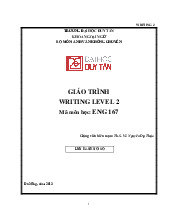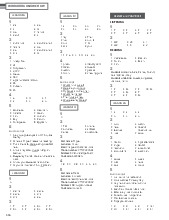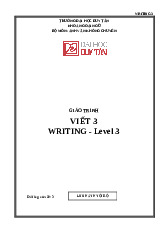

Preview text:
Full name: Dương Nguyễn Thu Thạnh ID: 27214702532 1. What is personality?
The sum total of ways in which an individual reacts to and interacts with others.
Most often described in terms of measurable traits that a person exhibits, such as shy,
aggressive, submissive, lazy, ambitious, loyal and timid.
2. What is the big 5 trait? Five Traits: Extraversion Agreeableness Conscientiousness Emotional Stability Openness to Experience
The following are the Big Five factors: Extraversion.
The extraversion dimension captures our comfort level with relationships. Extraverts
tend to be gregarious, assertive, and sociable. Introverts tend to be reserved, timid, and quiet. Agreeableness.
The agreeableness dimension refers to an individual’s propensity to defer to others.
Highly agreeable people are cooperative, warm, and trusting. People who score low on
agreeableness are cold, disagreeable, and antagonistic. Conscientiousness.
The conscientiousness dimension is a measure of reliability. A highly conscientious
person is responsible, organized, dependable, and persistent. Those who score low on this
dimension are easily distracted, disorganized, and unreliable. Emotional stability.
The emotional stability dimension—often labeled by its converse, neuroticism—taps a
person’s ability to withstand stress. People with positive emotional stability tend to be
calm, self-confident, and secure. Those with high negative scores tend to be nervous,
anxious, depressed, and insecure. Openness to experience.
The openness to experience dimension addresses range of interests and fascination with
novelty. Extremely open people are creative, curious, and artistically sensitive. Those at
the other end of the category are conventional and find comfort in the familiar. 3. Define heredity
Heredity is the most dominant factor
Twin studies: genetics more influential than parents
4. What is personality trait?
Personality traits are characteristics and qualities that help define you as a unique
individual. They’re often developed throughout life and may remain consistent across
many situations and circumstances.
5. How do values affect behavior?
Values can affect behavior in positive and negative ways.
When you live according to values, you lead a happier life. Values affect behavior by
acting as an internal GPS. Holding them in your mind can guide you to live a more meaningful life.
When you don’t live life in accordance with your values, you can feel down, and life can
seem meaningless. You may feel this way occasionally, or it could be constant. When
you feel this way it’s nearly impossible to find joy and happiness.
6. How do your personality affects your study right now?
I am a perfectionist and a bit introverted, which brings me both benefits and
disadvantages in my current studies. I'm a perfectionist in everything, I want everything I
do to always be perfect, I don't want it to deviate from the trajectory, this helps the things
I create to be of high quality but it can make it difficult for many people. They are
difficult when working with me because it's too strict. As for being introverted, it helps
me always have the mind to go to quiet, alone places to study. This helps me get through
my studie. However, during classes, I tend to be passive and nervous when speaking in
front of a crowd. This makes it difficult for me to advance. I am trying every day to be
able to improve myself better and communicate better. Being comfortable in front of
crowds is one of my future goals



